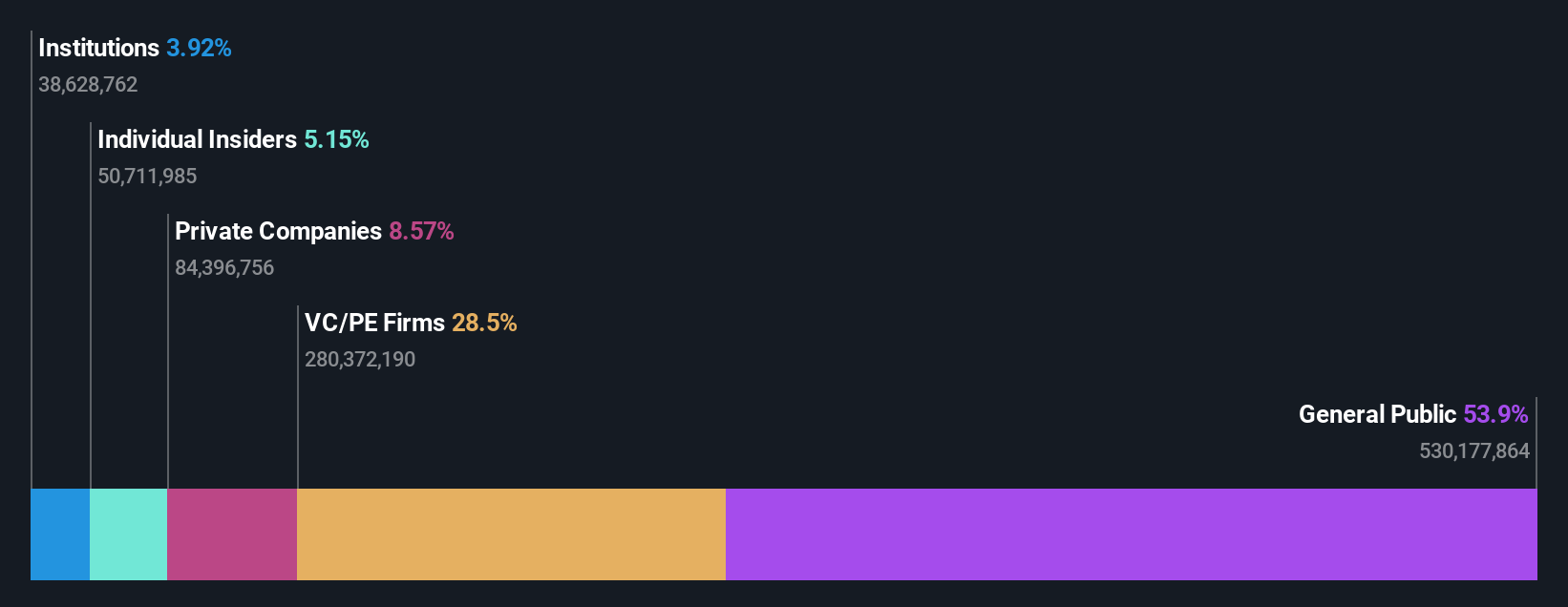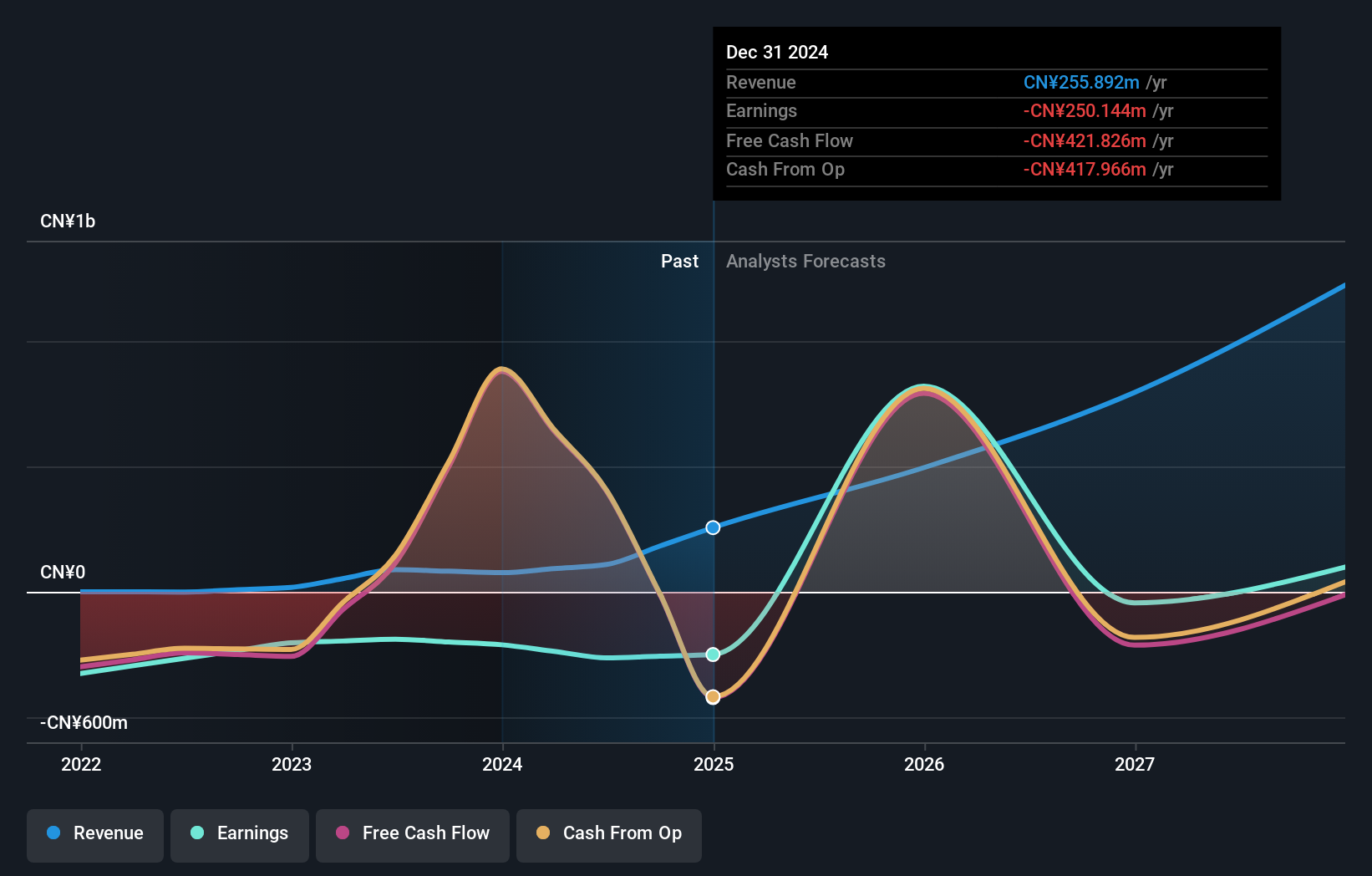Hua Medicine (Shanghai) Ltd.'s (HKG:2552) market cap surged HK$354m last week, individual investors who have a lot riding on the company were rewarded
Key Insights
- The considerable ownership by individual investors in Hua Medicine (Shanghai) indicates that they collectively have a greater say in management and business strategy
- A total of 15 investors have a majority stake in the company with 46% ownership
- Ownership research, combined with past performance data can help provide a good understanding of opportunities in a stock
To get a sense of who is truly in control of Hua Medicine (Shanghai) Ltd. (HKG:2552), it is important to understand the ownership structure of the business. And the group that holds the biggest piece of the pie are individual investors with 54% ownership. In other words, the group stands to gain the most (or lose the most) from their investment into the company.
Clearly, individual investors benefitted the most after the company's market cap rose by HK$354m last week.
Let's take a closer look to see what the different types of shareholders can tell us about Hua Medicine (Shanghai).
See our latest analysis for Hua Medicine (Shanghai)

What Does The Institutional Ownership Tell Us About Hua Medicine (Shanghai)?
Many institutions measure their performance against an index that approximates the local market. So they usually pay more attention to companies that are included in major indices.
Institutions have a very small stake in Hua Medicine (Shanghai). That indicates that the company is on the radar of some funds, but it isn't particularly popular with professional investors at the moment. So if the company itself can improve over time, we may well see more institutional buyers in the future. When multiple institutional investors want to buy shares, we often see a rising share price. The past revenue trajectory (shown below) can be an indication of future growth, but there are no guarantees.

Hua Medicine (Shanghai) is not owned by hedge funds. Arch Venture Partners, L.P. is currently the largest shareholder, with 13% of shares outstanding. With 11% and 8.6% of the shares outstanding respectively, VR Management, LLC and The Core Trust Company Limited are the second and third largest shareholders. Additionally, the company's CEO Li Chen directly holds 4.0% of the total shares outstanding.
Our studies suggest that the top 15 shareholders collectively control less than half of the company's shares, meaning that the company's shares are widely disseminated and there is no dominant shareholder.
While studying institutional ownership for a company can add value to your research, it is also a good practice to research analyst recommendations to get a deeper understand of a stock's expected performance. There is some analyst coverage of the stock, but it could still become more well known, with time.
Insider Ownership Of Hua Medicine (Shanghai)
The definition of an insider can differ slightly between different countries, but members of the board of directors always count. The company management answer to the board and the latter should represent the interests of shareholders. Notably, sometimes top-level managers are on the board themselves.
Insider ownership is positive when it signals leadership are thinking like the true owners of the company. However, high insider ownership can also give immense power to a small group within the company. This can be negative in some circumstances.
We can report that insiders do own shares in Hua Medicine (Shanghai) Ltd.. In their own names, insiders own HK$177m worth of stock in the HK$3.4b company. This shows at least some alignment. You can click here to see if those insiders have been buying or selling.
General Public Ownership
The general public -- including retail investors -- own 54% of Hua Medicine (Shanghai). This size of ownership gives investors from the general public some collective power. They can and probably do influence decisions on executive compensation, dividend policies and proposed business acquisitions.
Private Equity Ownership
With a stake of 28%, private equity firms could influence the Hua Medicine (Shanghai) board. Sometimes we see private equity stick around for the long term, but generally speaking they have a shorter investment horizon and -- as the name suggests -- don't invest in public companies much. After some time they may look to sell and redeploy capital elsewhere.
Private Company Ownership
We can see that Private Companies own 8.6%, of the shares on issue. Private companies may be related parties. Sometimes insiders have an interest in a public company through a holding in a private company, rather than in their own capacity as an individual. While it's hard to draw any broad stroke conclusions, it is worth noting as an area for further research.
Next Steps:
It's always worth thinking about the different groups who own shares in a company. But to understand Hua Medicine (Shanghai) better, we need to consider many other factors. For instance, we've identified 1 warning sign for Hua Medicine (Shanghai) that you should be aware of.
If you are like me, you may want to think about whether this company will grow or shrink. Luckily, you can check this free report showing analyst forecasts for its future.
NB: Figures in this article are calculated using data from the last twelve months, which refer to the 12-month period ending on the last date of the month the financial statement is dated. This may not be consistent with full year annual report figures.
Have feedback on this article? Concerned about the content? Get in touch with us directly. Alternatively, email editorial-team (at) simplywallst.com.
This article by Simply Wall St is general in nature. We provide commentary based on historical data and analyst forecasts only using an unbiased methodology and our articles are not intended to be financial advice. It does not constitute a recommendation to buy or sell any stock, and does not take account of your objectives, or your financial situation. We aim to bring you long-term focused analysis driven by fundamental data. Note that our analysis may not factor in the latest price-sensitive company announcements or qualitative material. Simply Wall St has no position in any stocks mentioned.
Contact Us
Contact Number : +852 3852 8500Service Email : service@webull.hkBusiness Cooperation : marketinghk@webull.hkWebull Securities Limited is licensed with the Securities and Futures Commission of Hong Kong (CE No. BNG700) for carrying out Type 1 License for Dealing in Securities, Type 2 License for Dealing in Futures Contracts and Type 4 License for Advising on Securities.

English